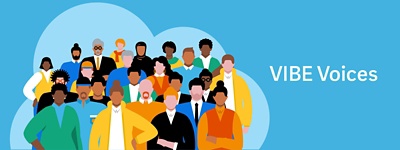This VIBE Voices story is shared by Lindsey Peterka, a senior consultant based in Amsterdam and co-lead of the Amsterdam chapter of the Women at Workday Employee Belonging Council.
It only takes choosing to use your voice to start a movement. We saw this from people like environmental activist Greta Thunberg, award-winning Nigerian author Chimamanda Ngozi Adichie, late U.S. Supreme Court Justice Ruth Bader Ginsburg, and many others. They didn’t need an army to start a movement. They used their voice to bring about change. As Pakistani activist Malala Yousafzai said, “When the world is silent, even one voice becomes powerful.”
Last month, many of us across the world celebrated International Women’s Day, which focused on the theme of “choosing to challenge.” That got me thinking about the times in my life where I chose to challenge and even how small moments and casual conversations can lead to lasting change.
As one example, a casual conversation with a former colleague was the spark that ignited my drive to bring awareness to the gender biases embedded in many of our systems and forge positive change.
Unconscious Bias Awareness Takes Just One Voice
Toward the end of my university studies, I attended a career workshop focused on helping students get jobs. The adviser in the workshop gave this career advice for women: If you’re engaged to be married, do not wear your engagement ring to interviews, and do not share information about being engaged or being in a serious relationship. The adviser said companies view women in these life situations as a lost investment because they believe women would get married, pregnant, and leave the workforce within a few years.
None of us in the workshop challenged the advice. We accepted it as just the way businesses work.
I didn’t realize the gender bias in that advice until a year later, when a female colleague made me aware that for male job applicants, being married helped them appear more stable and suited for a job. Research backs this up: Married job applicants who were men were perceived more favorably—in terms of being more willing to work long hours and more committed to the company—while married job applicants who were women were perceived less favorably.
In hindsight, I’m upset that I didn’t recognize the bias in that career workshop when it happened. But then again, my experience at university is a reflection of how often bias is deeply embedded in our system or processes. And, bias continues when we don’t question it. My former colleague chose to use her voice to point out the bias, and that conversation put me on a path to start educating myself and recognizing how gender bias shows up in many different areas of society—from the pink tax to maternity leave policies in Europe and the U.S.—and to start speaking up and pushing back.
Or in other words, choosing to challenge.






